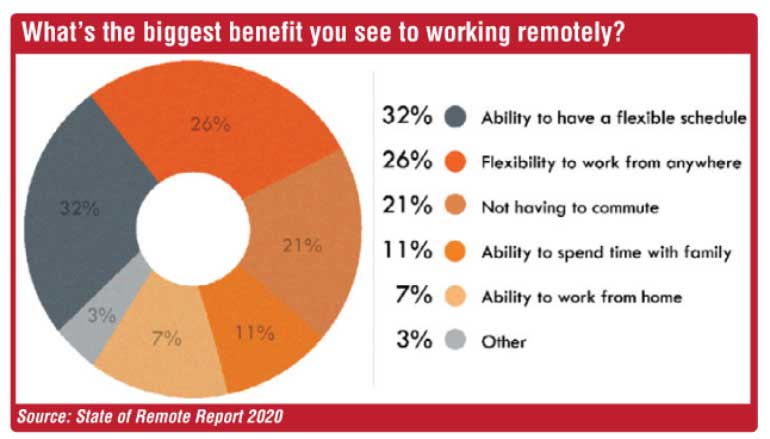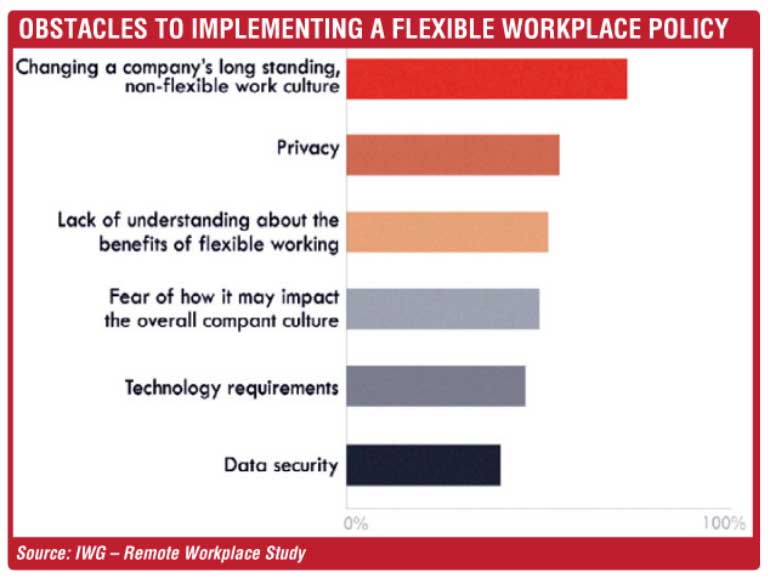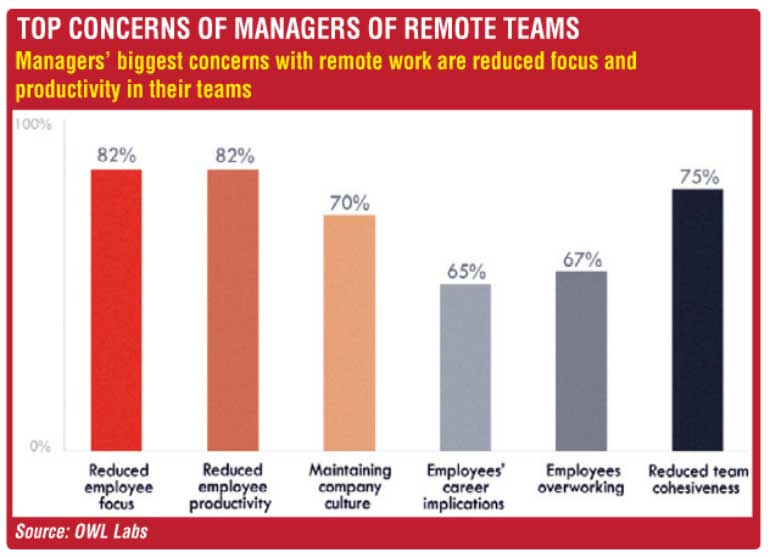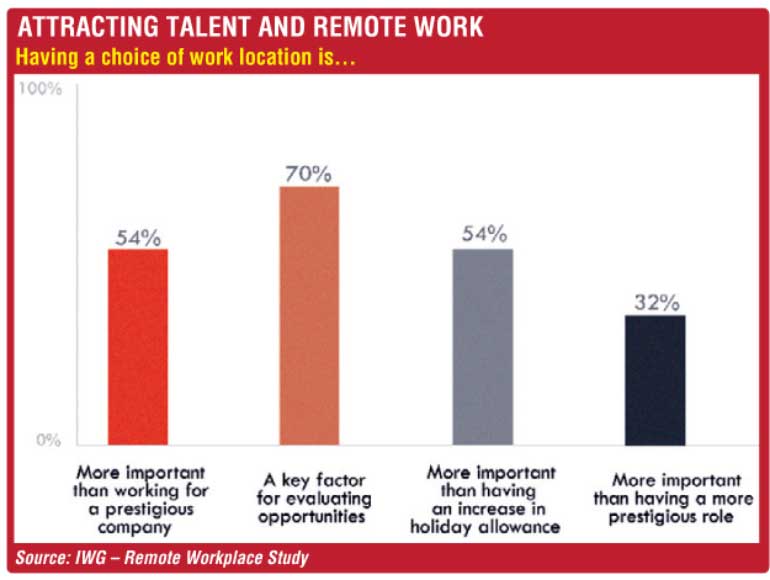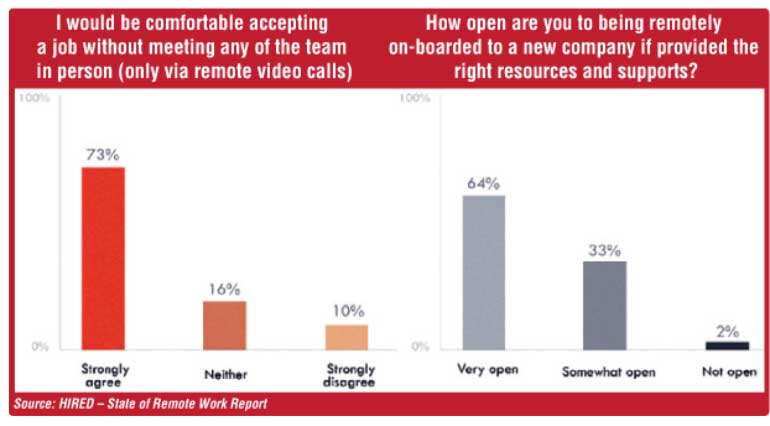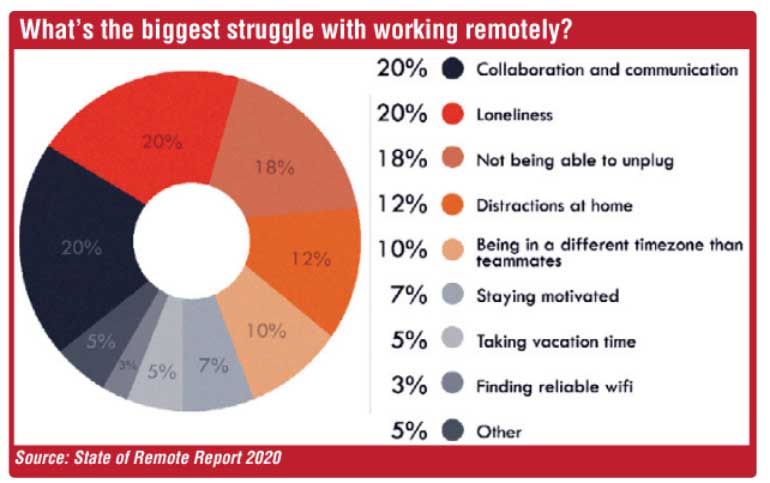Thursday Feb 26, 2026
Thursday Feb 26, 2026
Tuesday, 25 May 2021 00:52 - - {{hitsCtrl.values.hits}}
|
Sysco LABS General Manager Rasika Karunatilake
|
In the wake of COVID-19, most organisations have to confront a new normal – the death of the 9-5 regime with indications of never returning to this scenario, forcing a reset of major work trends in a post-pandemic world. This three-part serialised article delves into the future of work and emerging trends with fresh insight on the impact it is likely to have on us all.
Part 1 – The increase in remote working brings both benefits and pitfalls. While remote working offers employers greater flexibility, the obstacles in implementing work systems, managing performance and lack of social interaction and cohesion remains challenging. On a positive note, remote working helps to attract and retain talent with individuals working from home also now becoming aware and enjoying the economic value of work.
Earlier this month Salesforce announced that the majority of their employees were allowed to work from any location. Employees that lived in close proximity to an office were permitted to come in once or twice a week at their discretion, whereas those that lived in the suburbs were allowed leeway to work from home indefinitely. Only a minority of employees, whose jobs specifically required on-premises activity, were expected to report to work every day. Salesforce thus follows in the footsteps of other Silicon Valley tech giants like Twitter, Facebook and Square, all of whom have made similar announcements in the wake of the ongoing pandemic, as millions of people braved lockdowns and made the abrupt shift towards working from home.
The last several months have seen much media hype about the new normal; the drudgery of the early morning commute and returning home late at night is ostensibly a phenomenon of the past. People were able to customise their work schedules to incorporate family, work, and leisure. As lockdowns swept through the world, the speed and efficiency with which organisations and employees adapted was remarkable; kitchen countertops were converted into makeshift home offices and video communication became the norm as hitherto on-premises jobs rapidly transitioned online.
Organisations adopting this new form of working will have workplaces that are distributed across home, head office, and remote satellite offices; managers will determine the appropriate mode of work based on the nature of job functions and team preferences. Leaders will need to manage, coach, evaluate and motivate remote teams; technology will enable multiple modes of working and facilitate better team collaboration; data and applications will reside on the cloud with tailored access levels and security. The culture will evolve to prioritise trust, agility and belonging over systems and process.
This article examines some key considerations pertaining to the future of work and offers some insights on how the world of work may change in a post-pandemic environment. The present indications thus far are that the 9-5 work week may well be dead as the future of work is reshaped, potentially forever.
1. The flex life: key factors
Organisations that have surveyed their employees during the pandemic report that there is an overwhelming preference to work remotely due to the freedom it offers. A flexible schedule, being independent of a defined location and the absence of an arduous commute were the top reported benefits.
As months went by many people started to realize that working from home also came with a downside. The main issue faced by remote employees was the lack of communication and poor collaboration with team members. Loneliness brought about by a lack of social interaction was also cited as a key concern. Another issue reported was the inability to unplug from work; without clearly defined office hours many people had a tougher time dividing up their personal and professional time and ended up working longer hours.
Despite the popularity of flexible work, not all companies have universally embraced the concept. A major barrier is resistance to change or conflicts vis-a-vis archaic company policy. Privacy concerns and the impact on company culture was also cited as a case for returning to working from the office. Managers also have many lingering concerns around the effectiveness of remote work. Questions have been raised around diminished productivity levels, reduced employee focus and the impact on team cohesiveness. Managers surveyed also agree that there are certain types of conversations that are best conducted face to face – notably, on-boarding discussions, ‘difficult’ manager-employee conversations and critical business negotiations. Organisations will consequently need to invest in remote training and schedule more frequent employee touchpoints to increase efficiency. The performance management function will also need to prioritise key outcomes and achievement of objectives over time and effort.
Attracting and retaining talent will be paramount for many companies as the war for talent hots up later in 2021. Nearly two-thirds of candidates surveyed indicated that having a choice of work location is important when choosing an employer.
2. The creative energy of the workplace
The workplace is a social environment and business is a social phenomenon. As the pandemic unfolded, people around the world realised that they were missing the creative energy and the heartbeat of the office. It became evident that the spontaneous collaboration, trust and relationships built through simple gestures and physical interactions could not be replicated via video calls.
Many people now find the virtual environment boring and back-to-back online meetings have led to ‘Zoom fatigue’. Without face-to-face engagement or the casual ‘water cooler’ chats, individuals and teams are likely to gradually lose their sense of belonging. Managers have also opined that in-person activity is essential to building team spirit and drive innovation. The commitment to the organisation, its mission and values could be eroded and lost completely over time. It has also become evident that employees miss the camaraderie of socialising with their co-workers; workplace surveys indicate that meeting friends and arranging social engagements after work is a key motivator for coming into work for millennial and Gen Z employees. There are also obvious difficulties for new employees to build community or get the necessary assistance or resources. Soft skills development will also be hindered because of the lack of direct communication.
Companies have attempted to mitigate these issues by organising remote online engagement events such as happy hours. However, surveys indicate that employee engagement can wane over time and energising remote employees could prove difficult in the long run.
